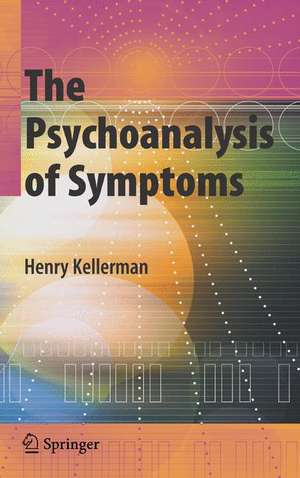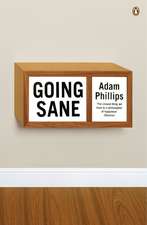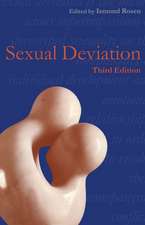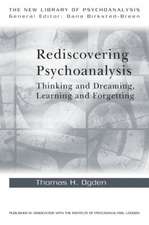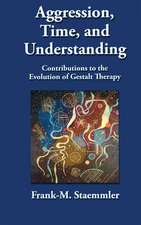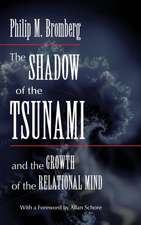The Psychoanalysis of Symptoms
Autor Henry Kellermanen Limba Engleză Hardback – 26 oct 2007
| Toate formatele și edițiile | Preț | Express |
|---|---|---|
| Paperback (1) | 362.88 lei 6-8 săpt. | |
| Springer – 29 oct 2010 | 362.88 lei 6-8 săpt. | |
| Hardback (1) | 369.65 lei 6-8 săpt. | |
| Springer – 26 oct 2007 | 369.65 lei 6-8 săpt. |
Preț: 369.65 lei
Preț vechi: 389.11 lei
-5% Nou
Puncte Express: 554
Preț estimativ în valută:
70.75€ • 76.88$ • 59.47£
70.75€ • 76.88$ • 59.47£
Carte tipărită la comandă
Livrare economică 21 aprilie-05 mai
Preluare comenzi: 021 569.72.76
Specificații
ISBN-13: 9780387722474
ISBN-10: 0387722475
Pagini: 169
Ilustrații: XVI, 170 p.
Dimensiuni: 156 x 235 x 13 mm
Greutate: 0.44 kg
Ediția:2008
Editura: Springer
Colecția Springer
Locul publicării:New York, NY, United States
ISBN-10: 0387722475
Pagini: 169
Ilustrații: XVI, 170 p.
Dimensiuni: 156 x 235 x 13 mm
Greutate: 0.44 kg
Ediția:2008
Editura: Springer
Colecția Springer
Locul publicării:New York, NY, United States
Public țintă
Professional/practitionerCuprins
Theoretical Context.- History of Symptom Psychology.- Underpinnings of the Symptom Code.- The Symptom-Code and Its Application.- On Wishes, Symptoms, and Withdrawal.- The Clinical Casebook: Accessible Symptoms.- Bottles Under the Bed: A Case of Compulsion.- Holes: A Case of Body Delusion.- Symptoms Based Upon Feelings of Rejection:.- Gazing at Corpses: A Case of Morbid Compulsion.- Sin of the Priest: A Case of Obsession.- Ingenious Regression: A Case of Hallucination.- Panic on the Bridge: A Case of Selective Agoraphobia.- “I Can Hardly Move”: A Case of a Three-Day Migraine.- Doubled Over: A Case of Displaced Phallic Obsession.- The Clinical Casebook: Inaccessible Symptoms.- The Psychology of Blushing: Involuntary Disclosure.- “No Writing!”: A Case of Delusional Self-Incrimination.- “I’m Not Going To Work Today”: A Case of Agoraphobia.- Chaos: A Case of Compulsive Collecting and Hoarding.- “Not Thin Enough!”: A Case of Anorexia.- Dissociative Identity Disorder: A Case of “Split Personality”.- An Asperger’s Mind: An Examination of the Case of Nobelian John Forbes Nash, Jr..- Examining Theoretical Issues of the Symptom-Code.- Acting Out: The First Symptom, and the Primacy of Anger or Sex.- Symptoms Versus Character Traits: Accessible Versus Inaccessible Symptoms.- The Metamorphosis of Symptoms: The Domain of Wishes and the Domain of Traits.
Recenzii
In this volume, Dr. Henry Kellerman has constructed a lens through which the inner working of pscyhological symptoms can be clearly seen. Along with this he has proposed a code for unraveling such symptoms. He then carefully applies this symptom-code, in detail, to a wide variety of symptoms. This is an important psychoanalytic work; and elegant conception, elegantly presented. -- Harry Sands, Ph.D., Founder and Executive Editor, Journal of Psychotherapy and Psychoanalysis; and Former President, New York State Psychological Association
In a compelling theoretical synthesis, Dr. Kellerman proposes that the only phenomenon in psychoanalysis and psychotherapy subject to cure is the patient's psychological symptom. All else is helping the patient struggle better. An X-ray of the symptom is developed and a method to efficiently penetrate the symptom is demonstrated. The important contribution here is that Kellerman has distilled the four basic elements that comprise a symptom-code -- a universal key that unlocks symptoms. I believe this work is a tour de force, and constitutes a classic advance psychoanalytic understanding. -- Vincenzo Conigliaro, M.D., Dean and Medical Director, Training Institute for Mental Health
Dr. Kellerman introduces a system called the symptom-code that enables clinicians to understand and treate a wide variety of debilitating symptoms. Much of Dr. Kellerman's case material reads like a detective story in which the symptom-code is applied and the meaning of the symptom becomes readily apparent. The reader will find these cases fascinating and the explanations given by Dr. Kellerman quite convincing. -- Mary Beth M. Cresci, Past President, Section of Psychologist/Psychoanalyst Practitioners
In a compelling theoretical synthesis, Dr. Kellerman proposes that the only phenomenon in psychoanalysis and psychotherapy subject to cure is the patient's psychological symptom. All else is helping the patient struggle better. An X-ray of the symptom is developed and a method to efficiently penetrate the symptom is demonstrated. The important contribution here is that Kellerman has distilled the four basic elements that comprise a symptom-code -- a universal key that unlocks symptoms. I believe this work is a tour de force, and constitutes a classic advance psychoanalytic understanding. -- Vincenzo Conigliaro, M.D., Dean and Medical Director, Training Institute for Mental Health
Dr. Kellerman introduces a system called the symptom-code that enables clinicians to understand and treate a wide variety of debilitating symptoms. Much of Dr. Kellerman's case material reads like a detective story in which the symptom-code is applied and the meaning of the symptom becomes readily apparent. The reader will find these cases fascinating and the explanations given by Dr. Kellerman quite convincing. -- Mary Beth M. Cresci, Past President, Section of Psychologist/Psychoanalyst Practitioners
Notă biografică
Henry Kellerman, Ph.D. is training analyst and senior supervisor at the Postgraduate Center for Mental Health in New York City. He is the author and editor of numerous works and scientific papers and was the editor of the Columbia University book series Personality, Psychopathology, and Psychotherapy: Theoretical and Clinical Perspectives. A former National Institute of Mental Health Fellow, Dr. Kellerman is also a fellow of the American Psychological Association and the American Group Psychotherapy Association. He maintains a private psychoanalytic practice in New York City.
Anthony Burry, Ph.D. is a clinical psychologist and psychoanalyst and Diplomate at the American Board of Assessment Psychology. He was formerly the Director of Psychology Internship training, supervisor, and faculty member at the Postgraduate Center of Mental Health. Dr. Burry was also Director of Psychological Evaluation at Comprehensive Psychological Services, and a Senior Supervisor of school mental health programs at the Brooklyn Center for Psychotherapy. He maintains a private practice in psychotherapy and psychodiagnostic testing in New York City.
Anthony Burry, Ph.D. is a clinical psychologist and psychoanalyst and Diplomate at the American Board of Assessment Psychology. He was formerly the Director of Psychology Internship training, supervisor, and faculty member at the Postgraduate Center of Mental Health. Dr. Burry was also Director of Psychological Evaluation at Comprehensive Psychological Services, and a Senior Supervisor of school mental health programs at the Brooklyn Center for Psychotherapy. He maintains a private practice in psychotherapy and psychodiagnostic testing in New York City.
Textul de pe ultima copertă
"In this volume, Dr. Henry Kellerman has constructed a lens through which the inner working of pscyhological symptoms can be clearly seen. Along with this he has proposed a code for unraveling such symptoms. He then carefully applies this symptom-code, in detail, to a wide variety of symptoms. This is an important psychoanalytic work; and elegant conception, elegantly presented." -- Harry Sands, Ph.D., Founder and Executive Editor, Journal of Psychotherapy and Psychoanalysis; and Former President, New York State Psychological Association
"In a compelling theoretical synthesis, Dr. Kellerman proposes that the only phenomenon in psychoanalysis and psychotherapy subject to cure is the patient's psychological symptom. All else is helping the patient struggle better. An X-ray of the symptom is developed and a method to efficiently penetrate the symptom is demonstrated. The important contribution here is that Kellerman has distilled the four basic elements that comprise a symptom-code -- a universal key that unlocks symptoms. I believe this work is a tour de force, and constitutes a classic advance psychoanalytic understanding." -- Vincenzo Conigliaro, M.D., Dean and Medical Director, Training Institute for Mental Health
"Dr. Kellerman introduces a system called the symptom-code that enables clinicians to understand and treate a wide variety of debilitating symptoms. Much of Dr. Kellerman's case material reads like a detective story in which the symptom-code is applied and the meaning of the symptom becomes readily apparent. The reader will find these cases fascinating and the explanations given by Dr. Kellerman quite convincing." -- Mary Beth M. Cresci, Past President, Section of Psychologist/Psychoanalyst Practitioners
In analysis, a particular symptom may be cured as a by-product of therapy, with neither the therapist nor the client knowing how the cure came about. But what ifthe therapist were armed with an analytically sound method, a "master key" for curing nearly all symptoms, regardless of client history?
In The Psychoanalysis of Symptoms, Henry Kellerman introduces the symptom-code, a powerful blueprint for understanding and eliminating a wide variety of clients’ psychological and emotional symptoms. This time-efficient method synthesizes knowledge of symptoms found throughout the psychiatric literature, empowering both analyst and client to larger underlying conflicts. The author demonstrates the procedure in step-by-step detail, with case examples that distinguish between curable symptoms and more ego-entrenched forms that can be diminished but not completely erased.
Included in this volume:
"In a compelling theoretical synthesis, Dr. Kellerman proposes that the only phenomenon in psychoanalysis and psychotherapy subject to cure is the patient's psychological symptom. All else is helping the patient struggle better. An X-ray of the symptom is developed and a method to efficiently penetrate the symptom is demonstrated. The important contribution here is that Kellerman has distilled the four basic elements that comprise a symptom-code -- a universal key that unlocks symptoms. I believe this work is a tour de force, and constitutes a classic advance psychoanalytic understanding." -- Vincenzo Conigliaro, M.D., Dean and Medical Director, Training Institute for Mental Health
"Dr. Kellerman introduces a system called the symptom-code that enables clinicians to understand and treate a wide variety of debilitating symptoms. Much of Dr. Kellerman's case material reads like a detective story in which the symptom-code is applied and the meaning of the symptom becomes readily apparent. The reader will find these cases fascinating and the explanations given by Dr. Kellerman quite convincing." -- Mary Beth M. Cresci, Past President, Section of Psychologist/Psychoanalyst Practitioners
In analysis, a particular symptom may be cured as a by-product of therapy, with neither the therapist nor the client knowing how the cure came about. But what ifthe therapist were armed with an analytically sound method, a "master key" for curing nearly all symptoms, regardless of client history?
In The Psychoanalysis of Symptoms, Henry Kellerman introduces the symptom-code, a powerful blueprint for understanding and eliminating a wide variety of clients’ psychological and emotional symptoms. This time-efficient method synthesizes knowledge of symptoms found throughout the psychiatric literature, empowering both analyst and client to larger underlying conflicts. The author demonstrates the procedure in step-by-step detail, with case examples that distinguish between curable symptoms and more ego-entrenched forms that can be diminished but not completely erased.
Included in this volume:
- The symptom-code: theoretical, scientific, and clinical contexts.
- Symptom-code procedures applied at different stages of symptom development.
- Accessible symptoms: the method used in treating obsessions, intrusive thoughts, migraines, compulsions, and agoraphobia.
- Treatment-resistant symptoms: uses of the method in cases of anorexia, hoarding, dissociative disorder, and more.
- Is it a symptom or a character trait? Personality issues and the symptom-code.
- The migration of symptoms in the psyche.
Caracteristici
Presents a “map” so that the reader can follow the cure-steps, and includes numerous cases with respect to this opportunity of tracing the cure of the symptom Identifies two categories of symptoms: those that can be cured through the talking method; and, those that need medication along with the talking method in order to be cured Offers criteria that enable a distinction to be made regarding any symptom -- as to whether the symptom is intractable and needs medication, or not Provides the reader a perspective of the history of symptom psychology, leading to this particular contribution regarding the discovery of the infrastructure of symptoms and their cure Illustrates through examples and discussion why some symptoms offer relief of tension while others increase tension
